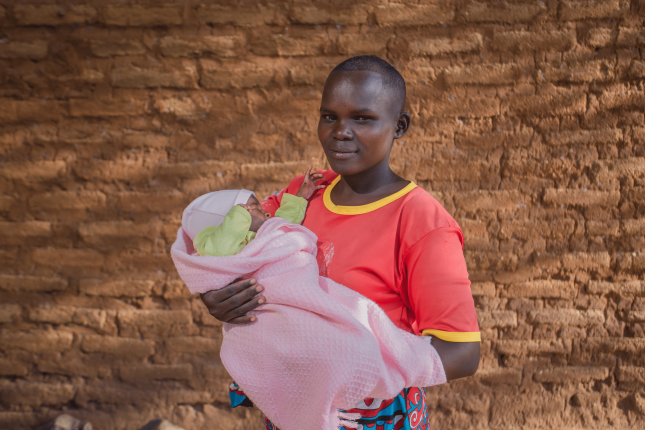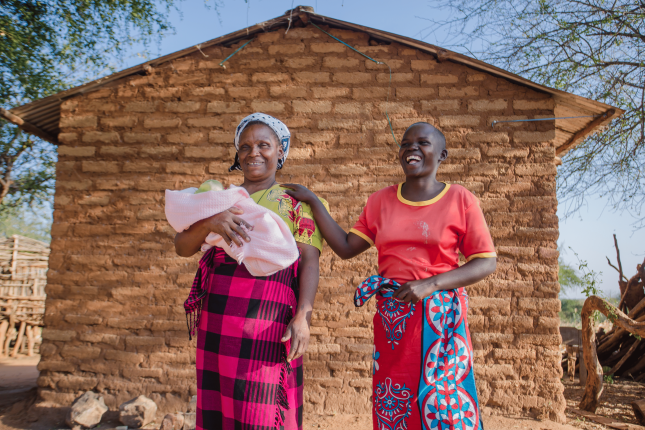-
Ensuring Essential Health Care for Mothers and Newborns During the Pandemic
March 24, 2021 By Koki Agarwal
Joyce Makasi, a young woman in Kambiti village, Kitui County, Kenya, went into labor with her second child one afternoon in December 2020. She had just enough money to hire a motorbike to take her to nearby Waita health center. At the facility, the clinical officer and nurse told her she would need a cesarean delivery. It wouldn’t be her first cesarean, but COVID-19 presented new obstacles.
The closest health facility with an operating room was 70 kilometers away over a rough patched road with little public transport. Worse yet, healthcare workers in Kenya were on strike, protesting the lack of personal protective equipment.
An hour passed. Then another. And then three.
In pain, Joyce paced the floor as the nurse and clinical officer called hospitals. At around 5 pm, the nurse at Waita told her that Tseikuru Hospital, an hour and a half drive from Waita, would send an ambulance. The hospital had a new operating room built by the Kitui county government. A partner organization had provided equipment for the operating room and agreed to pay the nurses at the hospital while the government negotiated with the striking health workers.
“The nurse at Waita told me to go home, get my clothes and wait there and the ambulance would come for me to take me to the hospital,” Makasi said. “The wait was not easy for me, because I did not trust they would come.”
A Difficult Situation Made Worse
For pregnant women around the world, the COVID-19 pandemic has made a delicate time even more uncertain. How will I receive routine antenatal and postnatal care? Is it safe to deliver in a health facility? Can a companion accompany me in the delivery room? Can I breastfeed even if I test positive for COVID-19? And what about the vaccine? Should I get it while pregnant or breastfeeding?
The pandemic has also had far-reaching effects on access to quality health care—from travel restrictions, to midwives and primary care providers reassigned to COVID-19 response, to postponed services, such as provision of long-acting reversible contraceptives and childhood immunizations. In a UNICEF survey from August 2020, 85 percent of 159 countries reported some disruption of essential services, and many reported a disruption of between 30 percent and 75 percent of essential services in 2020.
However, mothers in low- and middle-income countries such as Kenya faced challenges due to factors that existed long before the pandemic. COVID-19 exacerbated problems in already weak health systems and infrastructures, characterized by service delivery gaps and lack of clear and timely guidance, support for mothers, and reliable transport. Although the government of Kenya issued guidance on maintaining essential services during COVID-19, operational challenges, including enforcement of lockdowns and limited availability of personal protective equipment for healthcare providers, remained.
Maternal mortality in Kenya is high (342 per 100,000 live births), and a skilled healthcare worker attends only 6 in 10 women (62 percent) during delivery. Fear of contracting COVID-19, lockdowns, and curfews have only made these numbers worse. Many women chose to give birth at home, instead of in a healthcare facility. Others resorted to using traditional birth attendants, who cannot handle difficult births like Makasi’s. As a result, during the pandemic’s early months, Kenya reported an increase in stillbirths and maternal deaths.

Protecting Essential Services Is Key
Because a mother’s health affects the health of her entire family, it is critical that women continue to receive essential health services. For pregnant women and new mothers, such services involve quality antenatal care, delivery with a skilled birth attendant, breastfeeding support, and postnatal care. Other vital services include voluntary family planning, counseling, and support to prevent and respond to gender-based violence—the “shadow pandemic” of COVID-19.
World Health Organization (WHO) guidance provides practical recommendations for countries to maintain essential health services during the pandemic, and additional guidelines developed by the USAID’s MOMENTUM Country and Global Leadership and Jhpiego suggest how providers and facility managers can modify antenatal, intrapartum, and postnatal care to address pandemic-specific issues.
And countries have responded. In Kenya, for example, the Ministry of Health recommended interventions such as telemedicine for antenatal care and family planning visits; multi-month prescriptions of supplements and contraceptives; heightened water, sanitation, and hygiene and infection prevention and control precautions during and immediately following delivery, with mothers encouraged to maintain skin-to-skin contact and initiate breastfeeding even if they test positive for COVID-19. Countries across Africa have modified service delivery by staggering appointments to prevent crowding; implementing temperature checks, triage, and social distancing at facilities; task-shifting to expand service coverage at the community level; and engaging community health workers for home visits.
Importantly, even if policy and program guidance exists, dissemination and support for healthcare workers and facilities as they apply the guidance is critical. Countries have responded by ensuring that training, mentorship, and supportive supervision programs are in place. Technology has played a major role here, too, with many countries using Zoom, WhatsApp, and text messaging to hold webinars and trainings, share knowledge, and support supervision of health workers.
Lessons to Move Forward
As we move forward into 2021, anticipating the COVID-19 vaccine will make its way to more countries in Africa through efforts such as COVAX, we must take to heart the lessons learned from the pandemic and build resilient health systems that can withstand future shocks.
Regular, reliable, real-time data at service delivery and national levels are key to maintaining quality health care, with or without a pandemic. Such data will be critical to ensuring equitable coverage of the COVID-19 vaccine. A recently released WHO document provides guidance for using data to track COVID-19’s impact on essential health service at the national and subnational levels. Countries have put many of these recommendations into practice and are seeing the benefits.
A Healthy Start—and a Grateful Mom
Despite Makasi’s doubts, the ambulance did come, and she delivered a healthy baby—the same day that Kitui County Governor Charity Ngilu arrived to officially open the new operating room at Tseikuru Hospital. In honor of the government’s investment that ensured the happy outcome, Makasi named her baby girl Charity.
Makasi’s story reflects not only how she overcame obstacles posed by the pandemic, but also the importance of respectful, person-centered care that sees each person as an individual with needs specific to their situation and country context. Baby Charity’s safe and healthy birth was due in large part to the knowledgeable and thoughtful health workers at the Waita clinic who recognized Makasi’s need for advanced care early on and made determined efforts to ensure she received the care she needed. We must work to ensure that women worldwide receive the same level of care.
Koki Agarwal, MD, MPH, DrPH, is Director of MOMENTUM Country and Global Leadership and Vice President of DC Operations at Jhpiego.
Sources: Jhpiego, KTN News Kenya, PATH, The World Bank, UNICEF, United Nations, United Nations Population Fund, UN Women, USAID Momentum, World Health Organization.
Photo Credit: Joyce Makasi holding her baby, used with permission courtesy of Jhpiego; Joyce Makasi with her mother at home, used with permission courtesy of Jhpiego.
 A Publication of the Stimson Center.
A Publication of the Stimson Center.




